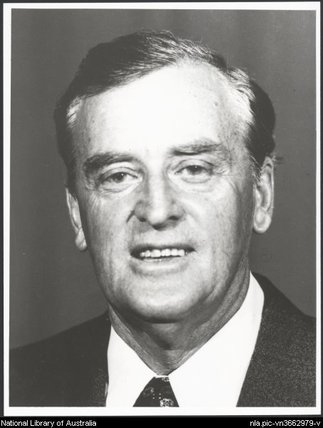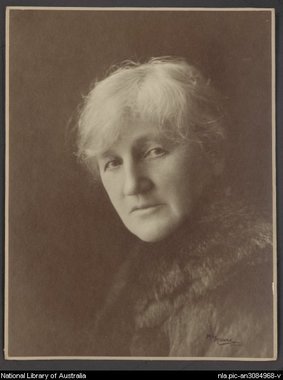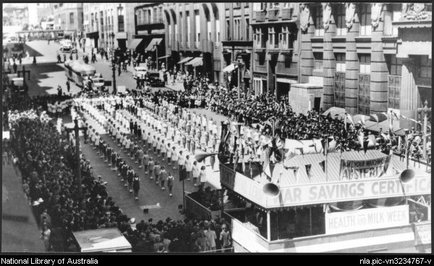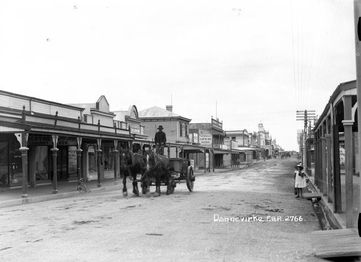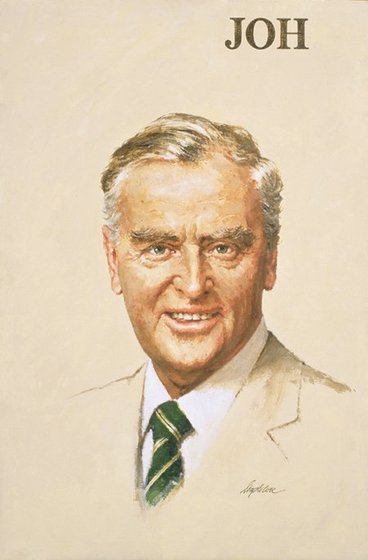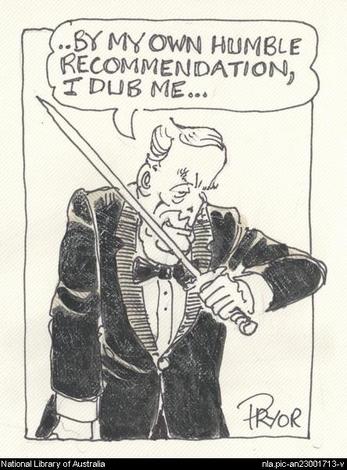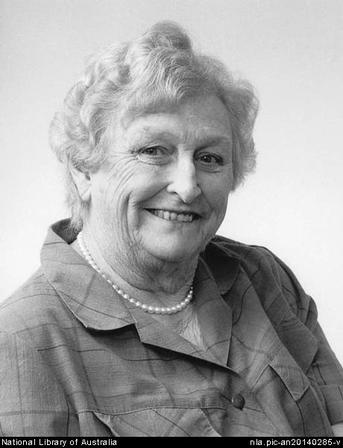the bjelke-petersen family
|
Johannes (Joh) Bjelke-Petersen is the most well known of the Bjelke-Petersen family, being Queensland’s longest-serving Premier and often described as one of the most controversial Australian politicians of the 20th century.
But before we get to Joh, let’s turn to his Danish grandparents, Georg Peter and Caroline. They emigrated from Denmark to Australia in the late 19th century with their five grown-up children, including Joh's father, Carl George. |
joh's grandparents
|
In 1891, Georg Peter Bjelke-Petersen, a gardener and later master builder, and his wife Caroline Vilhelmine (nee Hansen), both from Southern Jutland in Denmark, emigrated to Australia with their four sons and one daughter and settled in New Town, Tasmania. The children had been brought up in Denmark, and attended school in Germany before moving to London.
Their only daughter Marie Bjelke Petersen (1874-1969) was born in Copenhagen and later became a novelist selling more than 250,000 copies of her novels, quite an accomplishment at the time. In the 1920s, whilst researching for a book on miners, she became the first woman to go underground with working miners in Queenstown, Tasmania. She was honoured with the King’s Jubilee medal for services to literature in 1935. Marie was also involved in her two brothers’, Harald and Hans Christian, school, being in charge of the women’s section and later accredited with bringing the sport of netball to Australia. She was naturalised in 1915. Marie died in 1969, aged 94, in Hobart. |
The bjelke-petersen physical school
|
The school, the Bjelke-Petersen Physical Culture School, was started by Marie’s older brother Lt Col Hans Christian Bjelke-Petersen (1872-1964) in 1892 in Hobart. Two years later he was naturalised, and was also on the board of the Young Men’s Christian Association. In 1906, Hans moved to Sydney where he opened another institute followed by another in Melbourne in 1909. Despite not being Australian-born, Hans was made director (1911-1914) of a Commonwealth scheme of physical training under the Department of Defence and given the title of honorary lieutenant-colonel. In this role, he organised a system for school children as well as training of expert instructors for cadet forces and schoolteachers.
|
In 1927, Hans retired but stayed on as a senior director of the Bjelke-Petersen Institute and in 1933, he married Dorothy Gertrude Leonie (nee Henri). After WWI, Hans’ business flourished opening many centres state-wide. Hans Christian died in 1964 in Eaglehawk Neck, Tasmania.
Today there are 180 centres in Sydney, country NSW, Victoria, Queensland and the ACT. The Bjelke-Petersen School of Physical Culture was also used in the opening and closing ceremonies of the 2000 Summer Olympics in Sydney. In 2011 the company behind the schools, became a non-profit company and changed its name to Bjelke-Petersen School of Physical Culture Ltd.
Today there are 180 centres in Sydney, country NSW, Victoria, Queensland and the ACT. The Bjelke-Petersen School of Physical Culture was also used in the opening and closing ceremonies of the 2000 Summer Olympics in Sydney. In 2011 the company behind the schools, became a non-profit company and changed its name to Bjelke-Petersen School of Physical Culture Ltd.
joh's parents
|
Another brother, Carl George Bjelke-Petersen (known to the family as Georg), was 22 when the family emigrated to Tasmania. He taught at Scotch College in Hobart before joining the church and was ordained as a Lutheran pastor. He was posted to New Zealand in 1893 but resigned and was instead sent to Kangaroo Point, Brisbane. Here he met another Dane, Maren (nee Poulson), who had emigrated to Australia from Denmark when she was 7.
In 1903, Carl was again posted to New Zealand, where he married Maren. They had a son, Christian, who later was sent to Brisbane Grammar School, a daughter, Agnete (“Neta”), and a middle son, Johannes (Joh) Bjelke-Petersen. |
Joh was born on 13 January 1911 in the Scandinavian settlement, Dannevirke, on North Island, New Zealand. In 1913, the family moved back to Australia due to Georg’s poor health, and established a farm near Kingaroy in southeastern Queensland.
joh's early years
Aged just nine, Joh was struck down by polio, which left him with a life-long limp. Joh worked on the farm before and after school and at 13 he started working full-time to help the family pay off their debt, which had been further deepened after his father had purchased another farm to feed their herd of dairy cows. Georg insisted on the family speaking Danish at home and keeping Danish traditions.
Joh struck up a friendship with a local Lutheran pastor and taught Sunday school in the local area. The family was thoroughly religious and throughout his life, Joh made frequent references to this background and his beliefs, often using his local church as the backdrop for press photos. Although Joh had finished his formal schooling, he later enrolled in long-distance courses including an “Art of Writing” course through the University of Queensland.
Joh struck up a friendship with a local Lutheran pastor and taught Sunday school in the local area. The family was thoroughly religious and throughout his life, Joh made frequent references to this background and his beliefs, often using his local church as the backdrop for press photos. Although Joh had finished his formal schooling, he later enrolled in long-distance courses including an “Art of Writing” course through the University of Queensland.
entering politics
At the age of 22, Joh began clearing the land on the second farm for peanut farming after having convinced the bank to lend him money to buy a tractor. He also worked as a contract land-clearer on neighbouring farms. Due to his polio, Joh was deemed unfit for service in WWII and so he continued working on the land. Having expanded his land-clearing business by investing in bulldozers, Joh was a prosperous farmer at the age of 30. He also took flying lessons and used these skills in farming where he pioneered aerial spraying and seeding.
After the war, the Country Party courted Joh and in 1946 he was elected to the local Kingaroy Shire council. The following year, at 36, he won the Country Party state seat of Nanango (later named Barambah), which he held for the next 40 years. Since 1932, the Australian Labour Party had held power, and Joh spent 11 years as an opposition member.
After the war, the Country Party courted Joh and in 1946 he was elected to the local Kingaroy Shire council. The following year, at 36, he won the Country Party state seat of Nanango (later named Barambah), which he held for the next 40 years. Since 1932, the Australian Labour Party had held power, and Joh spent 11 years as an opposition member.
danish roots
|
In 1957, the Country Party won the state election with the Liberal Party as a junior coalition partner. Joh was appointed minister for works and housing in 1963 and was also acting minister for education, police, Aboriginal and Island Affairs, local government as well as for conservation and labour and industry. On 8 August 1968, Joh was sworn in as Premier of Queensland and dominated politics in the state for the next 20 years. He was a controversial and outspoken politician who favoured big business over unionism, social welfare, the environment and civil rights. He was known to suppress debate in Parliament, to deny information to the Opposition, and domineered the smaller coalition party, the Liberal Party.
Joh always portrayed himself as a rather primitive, but shrewd politician. He was a favourite ‘target’ in media and invariably journalists would attempt to ask him about controversial subjects, which brought the interviews to an abrupt end when Joh simply said “Don’t you worry about that”. Like his father, Joh placed great emphasis on his Danish background – he gave the impression that his sister and he talked to each other daily on the phone in Danish. At a press conference during one of his visits to Denmark, Joh started to speak Danish, albeit a heavily accented version of the Danish language confirming his family’s background in Southern Jutland where the Danish language even nowadays is often difficult to understand by Danes who speak “the Queen’s” Danish. |
end of a political career
|
Joh was knighted by Queen Elizabeth in 1984 (on his own recommendation). Two years later he returned to office and led a campaign, “Joh for PM”, to have himself elected to the federal Parliament.
However, with suspicions around his campaign funding and critics both within and outside parliament confronting him on his leadership, Joh resigned on 1 December 1988. Less than three years later, Joh went on trial for corruption and perjury but he went free when a hung jury ended the trial. It later transpired that the jury foreman was a member of Joh’s National Party and had assisted in raising funds for his trial. This led to legislative changes by setting up a permanent criminal justice commission to makes sure this could not happen again. Joh died on 23 April 2005. He was survived by his wife Flo. |
Florence (flo) bjelke-petersen (1920-)
|
In 1952, Joh married Florence “Flo” Gilmour, a private secretary of the Main Roads Commissioner.
The couple had four children, Meg, Ruth, Helen and John. Flo has also had a long career in politics. She represented Queensland in the Australian Senate from 1981 to 1993 and served as the deputy leader of the National Party of Australia between 1985 and 1990. Flo is famous for her signature pumpkin scones, publishing a cookbook with the recipe. She is now 94, living in Bethany, outside Kingaroy in Queensland and has a large family of four children, 13 grandchildren and great-grandchildren. |
john bjelke-petersen
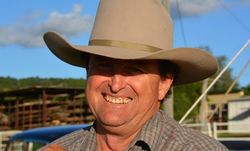 John Bjelke-Petersen
John Bjelke-Petersen
A son of Joh and Flo, is John Bjelke-Petersen who, like his parents, is involved in politics. In 2005 he was selected as the National Party candidate in the seat of Nanango at the state election, which he lost.
In 2013, he was defeated in the federal election where he had contested the Division of Maranoa seat on behalf of the Palmer United Party. In late 2014, the Palmer United Party announced that John was their new Queensland leader.
In 2013, he was defeated in the federal election where he had contested the Division of Maranoa seat on behalf of the Palmer United Party. In late 2014, the Palmer United Party announced that John was their new Queensland leader.
